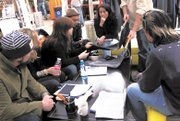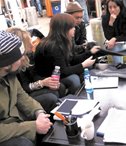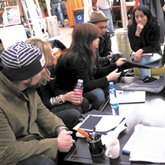Kingpins Debuts Spring 2011 Denim Trends
Ready to begin work on their Spring 2011 collections, denim designers and manufacturers braved a downpour to visit the Kingpins denim sourcing show Feb. 9–10 at the Smog Shoppe in Culver City, Calif. Attendees at the boutique show were met by 17 exhibitors offering goods from pocket lining and recycled-paper hangtags to hardware from Argentina and denim from Japan, China, the United States, Turkey and Spain.
ACG Denim, which makes denim from domestically grown cotton, and Ventura, Calif.–based label and trim supplier NexGen made their Kingpins Los Angeles debut. Apholos, the Argentinian hardware maker; Copen United, makers of pocketing; Central Fabrics from China; global sourcing company Itochu Denim Group; Orta, the Turkish denim maker; and Denim-Tech, the blue-jean laundry, were among Kingpins’ exhibitor roster. Kurabo brought its specialty denim from Japan and its more price-conscious denim from China as well as its piece-dyed products to the show. Tavex—which produces denim in such locales as South America, Mexico and Morocco—brought a variety of denim fabric to Kingpins, and Spanish cotton fabric maker Tejidos Royo debuted Denim Valley, its latest collection of denim fabrics.
While the New York editions of Kingpins tend to draw major casualwear manufacturers, the Los Angeles Kingpins continues to attract a who’s-who list of premium-denim and contemporary brands. Designers from J Brand, Goldsign, Joe’s Jeans, Lucky Brand, Levi’s, Agave, Juicy Couture, Guess, James Perse and Hurley shopped the show.
Despite the rainy weather, Paul Ledgett, president of Kingpins’ producer, New York–based Olah Inc., said the mood at the show was sunnier than in past seasons. Designers have moved away from the price-driven buying that has been key over the last year, he said. “There will always be a need for value, but designers have adjusted,” he said. “They know how to make a less expensive jean. Now style, hand, color are more important.” Exhibitors reported having success with denim and trims that reflect a vintage look. Denim with a throwback flair—whether stiff and raw, washed and greasy, soft and velvety, or super clean—earned plenty of attention.
Barry Emanuel, president of Copen, said his company saw a good response to pocketing treated to appear faded and aged. “Before, some designers sold vintage-style jeans with distressing and fading and tears, but the inside of the jeans looked shiny and new. Now, designers are paying attention to all the little details. If a jean looks old on the outside, the inside should match,” he said. Copen’s “C80” treatment makes for pocketing that fades and wears at the same rate as the jeans it lives in. Lilee Nicosia of NexGen said tea-stained, stitched and layered tags that complement vintage-style jeans have seen an uptick in demand.
Denim Valley, Tejidos Royo’s new vintage-inspired collection of denim fabrics, targets the premium market, said Jose Royo, the company’s sales director. To achieve the worn, vintage finish so popular among Los Angeles’ denim designers, Tejidos Royo collaborated with the Denim-Tech laundry. Designers wanting to achieve a similar look will be put in contact with Denim-Tech, said Tejidos Royo’s Raul Bermell.
Denimatrix, a Guatemalan jean maker and subsidiary of the Lubbock, Texas–based Plains Cotton Cooperative Association, came to Kingpins to highlight its design and manufacturing capabilities, said Wilson Avalos, Denimatrix’s commercial director. Even though the bulk of premium denim is designed in Los Angeles, not all brands have top-notch product-development capabilities, he said. “We can be very meaningful to those brands. We believe style, silhouette, fit and wash are all important, and we develop our own bodies and treatments. Because of that, we can present [designers] with ideas and collaborate or elaborate on their designs. We’re not here to sell manufacturing capacity,” Avalos said. Among Denimatrix’s latest ideas to show designers were skinny jeans for men and women with motorcycle styling and super-stretchy denim leggings bearing intricate laser-cut designs.
Kurabo’s Chinese-made collection got a few premium-style updates for Spring 2011. Kantamen—a new finish that makes denim softer even after home laundering, gives a better drape and reduces shrinkage—was introduced to the Los Angeles market. Developed by Kurabo, the finish can be used in denim ranging in weight from 4 oz. to 12 oz. “It’s a more sophisticated look,” Olah’s Ledgett said. Gray, a color that was previously unavailable in the Kurabo Hong Kong Denim repertoire, was added as a nod to premium-denim designers looking for a wider selection.

























